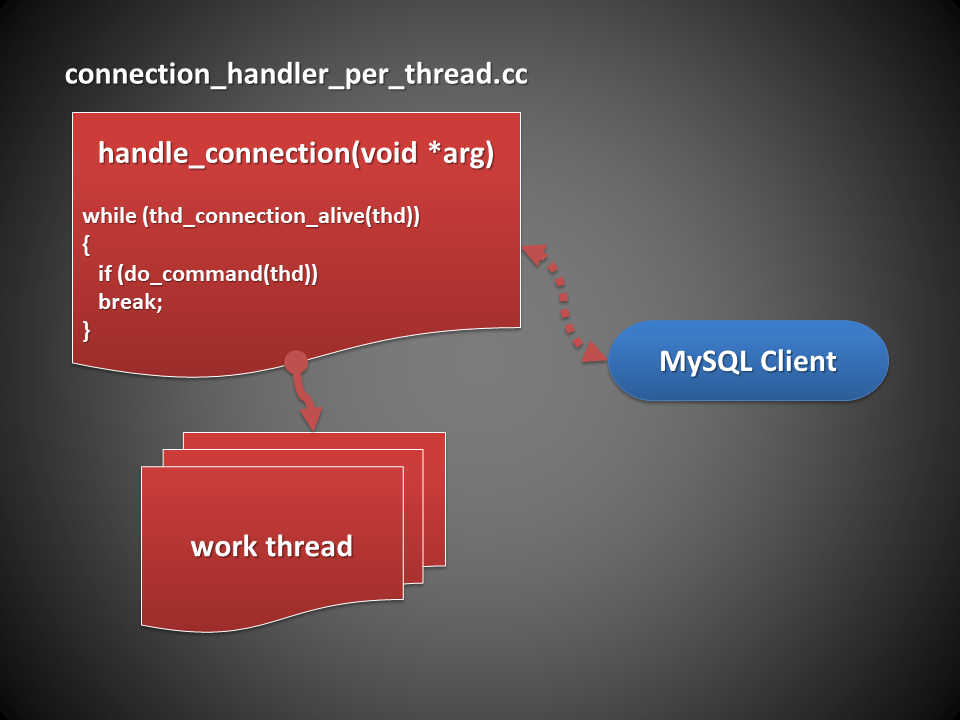MySQL 클라이언트에서 MySQL Protocol / Payload 를 보던, Trace 를 해보든…
어딘가에 Break Point 를 잡아야 하는데, MySQL Client 는 그냥저냥 따라가면 쉽지만…
MySQL Server 는 어디를 어떻게 잡아야 할지 난감합니다. Multi-Process 기반이 Multi-Thread 기반보다는 Debugging 이 용이하죠. 물론 와리가리하는 경우는 반대로 Multi-Thread 가 더 편하고요.
참고 :
https://oxnz.github.io/2016/07/20/mysql-primer-source/#connection
MySQL 은 handler connection manager 가 말그대로 connection 을 처리하기 때문에 가장 먼저 잡으시면 됩니다. ( thread 이름으로 충분히 추측이 가능하기 때문에 필요에 따라서 각 thread 에 break point 를 잡으셔서 활용하시면 편합니다. )
MySQL Server – Break Point !!

MySQL Client -> Server 로 Command 란 프로토콜?! 으로 Server Side 에 각 프로세스를 진행합니다. MySQL Source 에서 원하는 곳을 검색하거나, Trace 할 때 용이합니다.
my_command.h
/* Copyright (c) 2015, Oracle and/or its affiliates. All rights reserved.
This program is free software; you can redistribute it and/or modify
it under the terms of the GNU General Public License as published by
the Free Software Foundation; version 2 of the License.This program is distributed in the hope that it will be useful,
but WITHOUT ANY WARRANTY; without even the implied warranty of
MERCHANTABILITY or FITNESS FOR A PARTICULAR PURPOSE. See the
GNU General Public License for more details.You should have received a copy of the GNU General Public License
along with this program; if not, write to the Free Software
Foundation, Inc., 51 Franklin St, Fifth Floor, Boston, MA 02110-1301 USA */#ifndef _mysql_command_h
#define _mysql_command_h/**
@enum enum_server_command
@brief You should add new commands to the end of this list, otherwise old
servers won’t be able to handle them as ‘unsupported’.
*/
enum enum_server_command
{
COM_SLEEP,
COM_QUIT,
COM_INIT_DB,
COM_QUERY,
COM_FIELD_LIST,
COM_CREATE_DB,
COM_DROP_DB,
COM_REFRESH,
COM_SHUTDOWN,
COM_STATISTICS,
COM_PROCESS_INFO,
COM_CONNECT,
COM_PROCESS_KILL,
COM_DEBUG,
COM_PING,
COM_TIME,
COM_DELAYED_INSERT,
COM_CHANGE_USER,
COM_BINLOG_DUMP,
COM_TABLE_DUMP,
COM_CONNECT_OUT,
COM_REGISTER_SLAVE,
COM_STMT_PREPARE,
COM_STMT_EXECUTE,
COM_STMT_SEND_LONG_DATA,
COM_STMT_CLOSE,
COM_STMT_RESET,
COM_SET_OPTION,
COM_STMT_FETCH,
COM_DAEMON,
COM_BINLOG_DUMP_GTID,
COM_RESET_CONNECTION,
/* don’t forget to update const char *command_name[] in sql_parse.cc *//* Must be last */
COM_END
};#endif /* _mysql_command_h */
my_sqlcommand.h
/* Copyright (c) 2016, Oracle and/or its affiliates. All rights reserved.
This program is free software; you can redistribute it and/or modify
it under the terms of the GNU General Public License as published by
the Free Software Foundation; version 2 of the License.This program is distributed in the hope that it will be useful,
but WITHOUT ANY WARRANTY; without even the implied warranty of
MERCHANTABILITY or FITNESS FOR A PARTICULAR PURPOSE. See the
GNU General Public License for more details.You should have received a copy of the GNU General Public License
along with this program; if not, write to the Free Software
Foundation, Inc., 51 Franklin St, Fifth Floor, Boston, MA 02110-1301 USA */#ifndef _mysql_sql_command_h
#define _mysql_sql_command_h/*
@enum enum_sql_command
@brief SQL CommandsSQL Command is resolved during SQL parsing and assigned to the Lex
object, accessible from the THD.When a command is added here, be sure it’s also added in mysqld.cc
in “struct show_var_st status_vars[]= {” …If the command returns a result set or is not allowed in stored
functions or triggers, please also make sure that
sp_get_flags_for_command (sp_head.cc) returns proper flags for the
added SQLCOM_.
*/
enum enum_sql_command {
SQLCOM_SELECT,
SQLCOM_CREATE_TABLE,
SQLCOM_CREATE_INDEX,
SQLCOM_ALTER_TABLE,
SQLCOM_UPDATE,
SQLCOM_INSERT,
SQLCOM_INSERT_SELECT,
SQLCOM_DELETE,
SQLCOM_TRUNCATE,
SQLCOM_DROP_TABLE,
SQLCOM_DROP_INDEX,
SQLCOM_SHOW_DATABASES,
SQLCOM_SHOW_TABLES,
SQLCOM_SHOW_FIELDS,
SQLCOM_SHOW_KEYS,
SQLCOM_SHOW_VARIABLES,
SQLCOM_SHOW_STATUS,
SQLCOM_SHOW_ENGINE_LOGS,
SQLCOM_SHOW_ENGINE_STATUS,
SQLCOM_SHOW_ENGINE_MUTEX,
SQLCOM_SHOW_PROCESSLIST,
SQLCOM_SHOW_MASTER_STAT,
SQLCOM_SHOW_SLAVE_STAT,
SQLCOM_SHOW_GRANTS,
SQLCOM_SHOW_CREATE,
SQLCOM_SHOW_CHARSETS,
SQLCOM_SHOW_COLLATIONS,
SQLCOM_SHOW_CREATE_DB,
SQLCOM_SHOW_TABLE_STATUS,
SQLCOM_SHOW_TRIGGERS,
SQLCOM_LOAD,
SQLCOM_SET_OPTION,
SQLCOM_LOCK_TABLES,
SQLCOM_UNLOCK_TABLES,
SQLCOM_GRANT,
SQLCOM_CHANGE_DB,
SQLCOM_CREATE_DB,
SQLCOM_DROP_DB,
SQLCOM_ALTER_DB,
SQLCOM_REPAIR,
SQLCOM_REPLACE,
SQLCOM_REPLACE_SELECT,
SQLCOM_CREATE_FUNCTION,
SQLCOM_DROP_FUNCTION,
SQLCOM_REVOKE,
SQLCOM_OPTIMIZE,
SQLCOM_CHECK,
SQLCOM_ASSIGN_TO_KEYCACHE,
SQLCOM_PRELOAD_KEYS,
SQLCOM_FLUSH,
SQLCOM_KILL,
SQLCOM_ANALYZE,
SQLCOM_ROLLBACK,
SQLCOM_ROLLBACK_TO_SAVEPOINT,
SQLCOM_COMMIT,
SQLCOM_SAVEPOINT,
SQLCOM_RELEASE_SAVEPOINT,
SQLCOM_SLAVE_START,
SQLCOM_SLAVE_STOP,
SQLCOM_START_GROUP_REPLICATION,
SQLCOM_STOP_GROUP_REPLICATION,
SQLCOM_BEGIN,
SQLCOM_CHANGE_MASTER,
SQLCOM_CHANGE_REPLICATION_FILTER,
SQLCOM_RENAME_TABLE,
SQLCOM_RESET,
SQLCOM_PURGE,
SQLCOM_PURGE_BEFORE,
SQLCOM_SHOW_BINLOGS,
SQLCOM_SHOW_OPEN_TABLES,
SQLCOM_HA_OPEN,
SQLCOM_HA_CLOSE,
SQLCOM_HA_READ,
SQLCOM_SHOW_SLAVE_HOSTS,
SQLCOM_DELETE_MULTI,
SQLCOM_UPDATE_MULTI,
SQLCOM_SHOW_BINLOG_EVENTS,
SQLCOM_DO,
SQLCOM_SHOW_WARNS,
SQLCOM_EMPTY_QUERY,
SQLCOM_SHOW_ERRORS,
SQLCOM_SHOW_STORAGE_ENGINES,
SQLCOM_SHOW_PRIVILEGES,
SQLCOM_HELP,
SQLCOM_CREATE_USER,
SQLCOM_DROP_USER,
SQLCOM_RENAME_USER,
SQLCOM_REVOKE_ALL,
SQLCOM_CHECKSUM,
SQLCOM_CREATE_PROCEDURE,
SQLCOM_CREATE_SPFUNCTION,
SQLCOM_CALL,
SQLCOM_DROP_PROCEDURE,
SQLCOM_ALTER_PROCEDURE,
SQLCOM_ALTER_FUNCTION,
SQLCOM_SHOW_CREATE_PROC,
SQLCOM_SHOW_CREATE_FUNC,
SQLCOM_SHOW_STATUS_PROC,
SQLCOM_SHOW_STATUS_FUNC,
SQLCOM_PREPARE,
SQLCOM_EXECUTE,
SQLCOM_DEALLOCATE_PREPARE,
SQLCOM_CREATE_VIEW,
SQLCOM_DROP_VIEW,
SQLCOM_CREATE_TRIGGER,
SQLCOM_DROP_TRIGGER,
SQLCOM_XA_START,
SQLCOM_XA_END,
SQLCOM_XA_PREPARE,
SQLCOM_XA_COMMIT,
SQLCOM_XA_ROLLBACK,
SQLCOM_XA_RECOVER,
SQLCOM_SHOW_PROC_CODE,
SQLCOM_SHOW_FUNC_CODE,
SQLCOM_ALTER_TABLESPACE,
SQLCOM_INSTALL_PLUGIN,
SQLCOM_UNINSTALL_PLUGIN,
SQLCOM_BINLOG_BASE64_EVENT,
SQLCOM_SHOW_PLUGINS,
SQLCOM_CREATE_SERVER,
SQLCOM_DROP_SERVER,
SQLCOM_ALTER_SERVER,
SQLCOM_CREATE_EVENT,
SQLCOM_ALTER_EVENT,
SQLCOM_DROP_EVENT,
SQLCOM_SHOW_CREATE_EVENT,
SQLCOM_SHOW_EVENTS,
SQLCOM_SHOW_CREATE_TRIGGER,
SQLCOM_ALTER_DB_UPGRADE,
SQLCOM_SHOW_PROFILE,
SQLCOM_SHOW_PROFILES,
SQLCOM_SIGNAL,
SQLCOM_RESIGNAL,
SQLCOM_SHOW_RELAYLOG_EVENTS,
SQLCOM_GET_DIAGNOSTICS,
SQLCOM_ALTER_USER,
SQLCOM_EXPLAIN_OTHER,
SQLCOM_SHOW_CREATE_USER,
SQLCOM_SHUTDOWN,
SQLCOM_ALTER_INSTANCE,
/* This should be the last !!! */
SQLCOM_END
};#endif /* _mysql_sql_command_h */